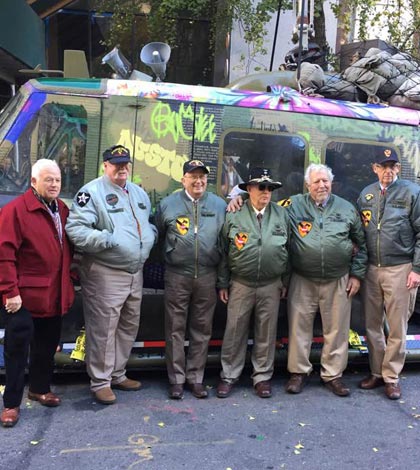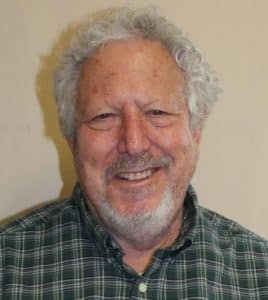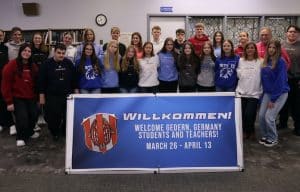Dentist scarred, not broken by Vietnam

Pictured, from left, are artist Steve Maloney, Dave Barron of Light Horse Legacy, which salvaged the aircraft; and former crewmen Walt McNees, Dave Adams, Dr. Eric Berla, and Ralph Tutrani in front of the “Take Me Home Huey” sculpture. (submitted photo)
When veterans returned home from the Vietnam War, few experienced a warm welcome, a hearty handshake, a compassionate hug, or any kind of acknowledgement of the horrors they faced.
Many veterans’ accounts in fact described hearts filled with malice and profanity-laced interactions with the people for whom they fought. Not to mention, the tragedies of Vietnam bred survivor’s guilt and post-traumatic stress disorder.
“Those of us who were shot at — there’s no way you can go through that stuff and not have issues,” said 74-year-old Dr. Eric Berla, a Vietnam veteran and dentist with a practice in Waterloo.
These circumstances led many returning soldiers to feel as though their longing to return home was never satisfied. In the past several decades, Americans have made attempts to reconcile this.
Veterans who served in Vietnam now receive a long overdue “Welcome home” from those who understand the disparities they once faced during their homecoming. However, one national artist chose to address Vietnam veterans’ discomfort with a bit more creativity.

Dr. Eric Berla
Steve Maloney, a California-based artist, completed a restoration project in 2015 of the Huey 174 med-evac helicopter Berla and his unit flew for transporting supplies, field personnel and wounded or dead soldiers.
Maloney’s project — “Take Me Home Huey” — involved turning the junked aircraft into a sculpture with spray paint and decals to help veterans overcome their PTSD.
The story behind the sculpture and the veterans in Berla’s unit who survived the war, are featured in the new TV documentary by the same name. “Take Me Home Huey” will air on PBS at 10 p.m. Nov. 7 and 1 a.m. Nov. 10.
Additionally, the film will be screened at 2 p.m. this Sunday at the Nine Network studio, 3655 Olive Street in St. Louis, during an event presenting an exhibit of artifacts and art. A panel discussion will follow the viewing opportunity.
“I liked the movie a lot. I think it’s well done,” Berla said about the upcoming documentary.
This new film comes on the heels of the recently aired documentary by Ken Burns, which drew rave reviews.
“By the time I saw the movie, I knew much of it. I researched it extensively,” he said. “But, yeah I thought it was great. He’s an amazing storyteller.”
Berla, who lives in University City, Mo., and commutes to his office at 303 E. Fourth Street in Waterloo, said he knows too well the pain that comes from fighting the Vietcong.
In 1969, while in the First Calvary Division, 15th Medical Battalion, Berla returned home from the war during a month of leave. That’s when tragedy struck his unit.
During a medical rescue mission, the unit’s Huey 174 was shot down, and both crew chief Gary Dubach and medic Stephen Schumacher lost their lives in the process.
“I came back to Vietnam and found out that my crew was killed. That’s the story that they told me or maybe I don’t remember correctly,” he said. “I didn’t know that anyone had actually survived.
“I was devastated. I had survivor’s guilt. It felt like I had deserted them and now they’re dead. Command in combat is a (brutal) responsibility.”
Thanks to Dave Barron of Light Horse Legacy, the company that salvaged the Huey, Berla was later reconnected with Ralph Tutrani, the other survivor of the unit, and got to see the sculpture during a 2015 unveiling in Arizona.
“It was more (reconnecting) with the people,” Berla said of what was meaningful about the 2015 experience. “The door gunner (Tutrani) was obviously a bright guy. We had flown together.”
Berla’s time in the service from 1965 to 1970 was marked by plenty of intense combat. On a mission south of Loc Ninh to hoist a service dog and his handler, his crew’s helicopter came under fire.
“There was one round that came up through the floor and tore through my pant leg and came up and hit the radios,” he said. “It knocked out all of the comms.
“When it happened, all of a sudden, I felt a smack on my leg. And I knew from talking to some people that you don’t feel it. You just feel a concussion.”
He later discovered that the bullet did not hit him, but Berla also noted that getting shot at during hoist missions was often par for the course.
“We hated hoist missions,” he said.
On many occasions, Berla was commended for his service with a number of air medals, and also received the Combat Medical Badge, Distinguished Flying Cross and Bronze Star.
Berla spent his final six months in Vietnam as a pilot transporting VIPs in Saigon.
The war still touches Berla, but over the years, he said he and some of the men he has kept in touch with have found ways to cope with the pain.
“We all healed. Everybody had issues with PTSD,” he said. “All of us — on the face of it, we have successful careers. Successful lives. We’re still married to our first wives and we have grandchildren.
“But we were all scarred.”






